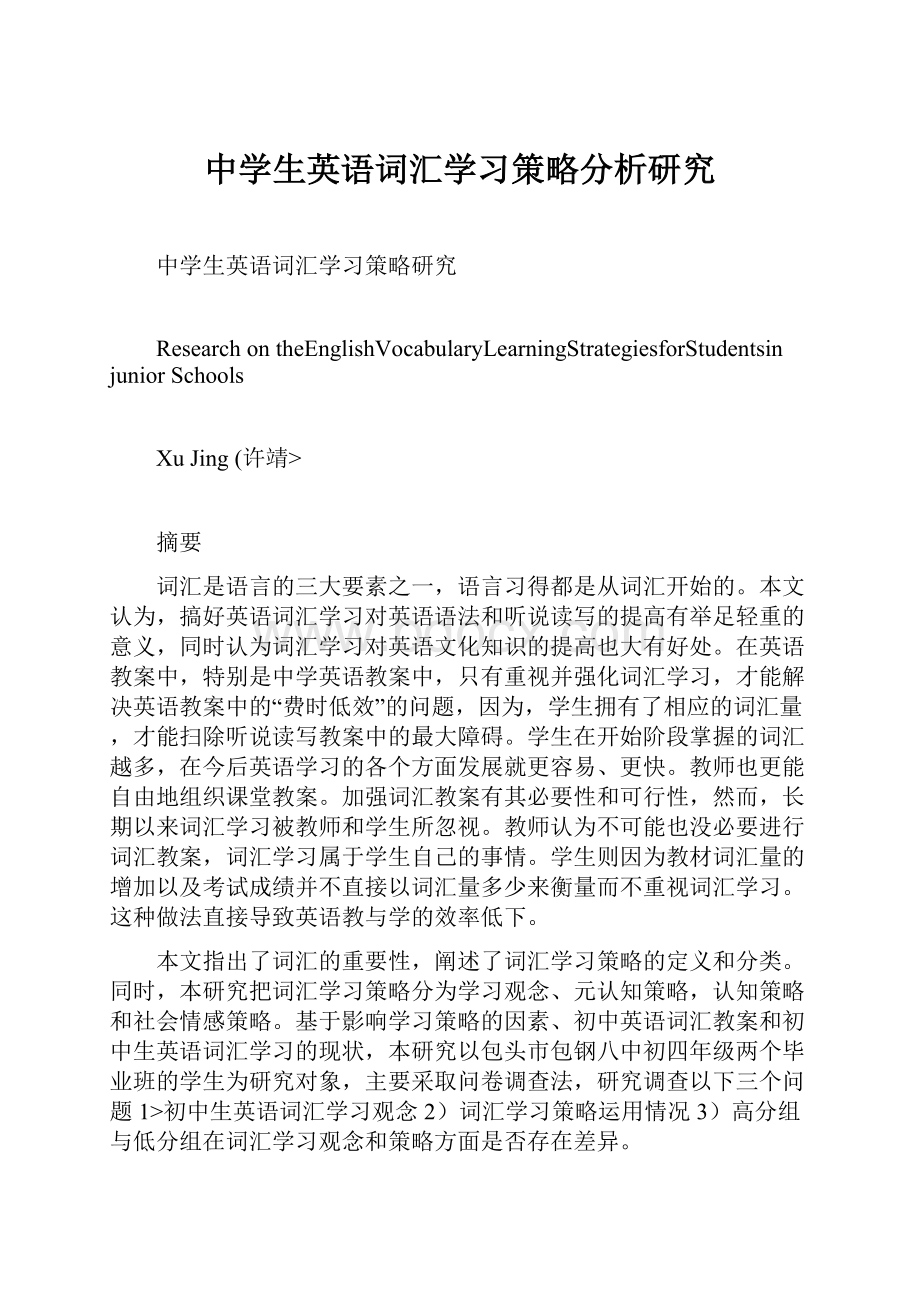中学生英语词汇学习策略分析研究.docx
《中学生英语词汇学习策略分析研究.docx》由会员分享,可在线阅读,更多相关《中学生英语词汇学习策略分析研究.docx(51页珍藏版)》请在冰豆网上搜索。

中学生英语词汇学习策略分析研究
中学生英语词汇学习策略研究
ResearchontheEnglishVocabularyLearningStrategiesforStudentsinjuniorSchools
XuJing(许靖>
摘要
词汇是语言的三大要素之一,语言习得都是从词汇开始的。
本文认为,搞好英语词汇学习对英语语法和听说读写的提高有举足轻重的意义,同时认为词汇学习对英语文化知识的提高也大有好处。
在英语教案中,特别是中学英语教案中,只有重视并强化词汇学习,才能解决英语教案中的“费时低效”的问题,因为,学生拥有了相应的词汇量,才能扫除听说读写教案中的最大障碍。
学生在开始阶段掌握的词汇越多,在今后英语学习的各个方面发展就更容易、更快。
教师也更能自由地组织课堂教案。
加强词汇教案有其必要性和可行性,然而,长期以来词汇学习被教师和学生所忽视。
教师认为不可能也没必要进行词汇教案,词汇学习属于学生自己的事情。
学生则因为教材词汇量的增加以及考试成绩并不直接以词汇量多少来衡量而不重视词汇学习。
这种做法直接导致英语教与学的效率低下。
本文指出了词汇的重要性,阐述了词汇学习策略的定义和分类。
同时,本研究把词汇学习策略分为学习观念、元认知策略,认知策略和社会情感策略。
基于影响学习策略的因素、初中英语词汇教案和初中生英语词汇学习的现状,本研究以包头市包钢八中初四年级两个毕业班的学生为研究对象,主要采取问卷调查法,研究调查以下三个问题1>初中生英语词汇学习观念2)词汇学习策略运用情况3)高分组与低分组在词汇学习观念和策略方面是否存在差异。
采用SPSS软件分析数据,结果表明:
1)在词汇学习观念方面,大部分学生仍然认为词汇来自背诵记忆而不是从上下文或通过使用获得的2)初中生能运用包括元认知策略、认知策略和社交情感策略在内的多种策略来进行词汇的学习,但各策略的运用处于中等水平。
3)高分组和低分组在学习观念与元认知策略方面存在显著差异而在认知策略和社会情感策略方面差异不大。
针对以上现状,结合自己所学的有关理论和教案经验,从改变词汇学习观念,培养训练词汇学习策略两个方面提出了改善初中生英语词汇学习的几点具体措施。
总之,词汇学习就像整个语言学习大厦的基石,要想大号根基,既要学生在英语词汇学习中能合理地运用多种学习策略,同时又要求教师转变观念,不仅做“知识的传递者”,还要做“策略的指导者”,将策略的指导贯穿于日常的教案之中。
关键词:
词汇,词汇学习策略,词汇教案,英语教案
Abstract
Vocabularyisoneofthethreeelementsofalanguage.What'more,languagelearningbeginswithvocabulary.Ofcourseitplaysanimportantpartinlanguagestudy.Inthisthesis,itisarguedthatlearningEnglishvocabularymakesgreatcontributiontothedevelopmentofgrammar,listening,speaking,readingandwriting,andtotheenrichmentofEnglishcultureknowledge.Vocabularyevenhaseffectonbeingmoreintelligentinstudents'lifeaswellasineducation.
InEnglishteaching,especiallyinjuniorschools,ifvocabularyiscenteredandemphasized,theproblemof"time-consumingandpoorly-efficient"Englishteachingwillbesolvedbecausequalifiedlearningofthevocabularyofstudentsabsolutelywipeoffthebiggestobstacle-vocabulary.ThemorevocabularystudentsacquireatprimarystageofEnglishstudy,themoreeasilyandfasterstudentsdevelopotheraspectsofEnglishstudyinfutureyears.Thisway,itiseasierforteacherstoconductclassroominstructionsifstudentsreachthelevelofvocabulary.Emphasisonvocabularyisreasonableandfeasible.However,vocabularystudyhaslongbeenignoredbothbystudentsandschools.Teachersthinkitisimpossibleandunnecessarytogivevocabularyteachingandstudentsthemselvesshouldberesponsiblefortheirincreaseinvocabulary.Studentsputitasidebecausetheyarenotscoredaccordingtotheamountofvocabulary.ThispracticecausestomakeslowprogressinEnglishlearning.
Basedontheclassificationoftheforeignlanguagelearningstrategies,thevocabularylearningstrategiesthispapertriestostudyincludebeliefsonEnglishvocabularylearning,meta-cognitivestrategies,cognitivestrategiesandsocial/affectivestrategies.AccordingtothefactorsthatinfluencetheuseoflearningstrategiesandthefactsofEnglishvocabularyteachingandlearninginjuniorschool,thisresearchfocusesonthefollowingresearchquestions:
1)Whatarethegeneralbeliefsofvocabularylearningstrategiesheldbyjuniorschoolstudents?
2)Whatvocabularylearningstrategiesareusedbythestudentsintheirlanguagelearning?
3)Aretheredifferencesonbeliefsandstrategiesusingbetweenthehigh-scorestudentsandthelow-scorestudentsinEnglishstudies?
ThenthewriterusedSPSS13.0toanalyzethedataanddrewtheconclusion:
1)Thevocabularylearningbeliefs"wordsshouldbememorized"ismorepreferablethanthebelief"wordsshouldbelearnedthroughcontext”and"wordsshouldbelearnedthroughuse"amongtheinvestigatedstudents.2>Thecurrentsituationofusingvocabularylearningstrategiesbythosejuniorschoolstudentsisnotsatisfactory,withthemeanrangeof2.06-3.87(onafive-pointscale>,whichsuggeststheiruseisatthemediumlevel.3>Beliefsandmeta-cognitivestrategiesweredifferentsignificantlybetweenthehigh-scoreandlow-scoregroups.Buttherearenosignificantdifferencesoncognitiveandsocialstrategiesbetweenthetwogroups.Finally,accordingtotheresultsofthepresentstudyandwriter’sexperience,somesuggestionsaremade.
Keywords:
vocabulary,vocabularylearningstrategies,vocabularyteaching,Englishlearningandteaching
I.Introduction
1.1ImportanceofVocabularyLearning
Inthetrendofglobalization,internationalizationoflanguageisunavoidable.Englishwillundoubtedlyplaythemostimportantrole.ThebettermasteryofEnglishatearlierageshasbecomethecommonconcernsoflinguists,teachers,parentsandstudentsinChina.Researchesonlanguageteachingandlearningarenowblooming.Astheresearchesfurther,themasteryofvocabularyisattractingmoreandmoreattentionofalllevelsofresearchers.Asweallknow,languageistheinstrumentofcommunication.Alanguageinvolvesthreeelements:
pronunciation,vocabularyandgrammar.Itisobviousthatvocabularyisthemostessentialandliveliestpartofthethreeelements.ThefamouslinguistWilkins(1978:
111>comments:
"Withoutgrammar,littlecanbeconveyed。
withoutvocabulary,nothingcanbeconveyed".Wordknowledgeisanessentialcomponentofcommunicativecompetence,anditisimportantforproductionandcomprehensioninasecondlanguage(Coady&Huckin,1997>.Ontheimportanceofvocabularyincommunication,M.McCarthy(1990>indicates,"Nomatterhowgoodone'sgrammarisandhowbeautifulone'spronunciationis,butifonehasnoadequatevocabularytoexpressone'sownfeelingsortounderstandothers'opinions,onestillcannotcommunicatewithothersinthislanguage".Asanessentialandfundamentalbuildingblockoflanguage,vocabularylearningisakeyaspectoflanguagelearning,whichevercurriculumorsyllabuswearefollowing,andwhichevermodeloflanguageweareapplying.Thefourtraditionalbasiclanguageskillsofreading,writing,speakingandlisteningareallbaseduponthestudents'vocabularyknowledge.
1.2Currentconditionsofvocabularylearninginjuniorschool
InChina,Englishisacompulsorysubjectformiddleschoolstudents,andexpandingEnglishvocabularyknowledgeisoneofthefundamentalgoalsforChinesestudentslearningEnglish..AccordingtotheNewStandardontheEnglishCourseofJuniorMiddleSchool(2003>,thestudentsareexpectedtomasterabout1500-1600words,200-300phrasesproductively,and100-400extrawordsreceptivelyaftergraduatingfromjuniorschool.Besides,agreatincreaseofvocabularyinthenewEnglishtextbookGoforit!
hasmadelearningofvocabularyamoreimportantroleinEnglishlearningandteachinginjuniorschool.
However,presentvocabularyteachingandlearninggenerallyfollowthetraditionalpatternofwordlists.Vocabularylearningbecomesthemostdifficultpartformostlanguagelearnersandhinderstheimprovementofotherlanguageskills.Manyjuniorschoolstudentsfeelitisdifficulttolearnandremembervocabulary.Theyoftenfeelfrustratedinrememberingthepronunciation,spellingandmeaningofEnglishwords.Andtheyoftenforgetthewordsquicklyagain.Eventhoughtheyareabletoremembersomewords,theyoftenusethemincorrectlyorinappropriately.Thisresultsintheirweaknessinlistening,speaking,readingandwriting.SomeevengiveupEnglishlearningbecauseofdifficultyoflearningvocabulary.Whydostudentshaveproblemswithvocabularylearning?
Whatvocabularylearningstrategiesaretheyusingandaretheirstrategieseffectiveandappropriate?
Teachersshouldhelpstudentstobeawareofthevocabularylearningstrategiesanddevelopmoresuitableandeffectivevocabularylearningstrategies.Itisalsousefulfortheteachertobeawareofthevarietyofmethodsusedbystudentstocopewithwords,tointroducesomeofthesethroughteachingandtoencouragestudentstoapplyeffectivestrategies.1.3Thepurposeofthestudy
Thecurrentstudyisconcernedwiththequestion:
Whydostudentshaveproblemswithvocabularylearning?
Theselearningproblemsmayresultfromalackofadequateandeffectivevocabularylearningstrategies.Whenstudyingvocabularylearningstrategiesasaunifiedconcept,however,itshouldnotbeforgottenthattheyareforthebenefitofthelearner.Thus,wemustconsiderourstudents'feelings,andtakenoteofwhattheythinkofthevariouslearningstrategies(Horwitz,1988。
Wenden.1987>.Inaddition,Hosenfeld(1976>notesthat,“Toooftenourfocushasbeenonwhatstudentsshouldbedoing。
wemustbeginbyaskingwhatstudentsaredoing”(p.128>.Beforewetellstudentswhattodowiththeirvocabularylearning,wemustknowwhattheyaredoing,thatistosay,whichvocabularylearningstrategiestheyareusing.Thecurrentstudyisundertakenforthispurpose.Theresearchertriestofindthereasonwhystudentshaveproblemswiththeirvocabularylearningbyinvestigatingthestrategyuseofstudentsinjuniorschoolanddiscussingthecharacteristicsintheirstrategyuse.Theresearcheralsotriestogetsomeinformationaboutvocabularylearningstrategyuseofjuniorschoolstudentsinordertomakesomesuggestionsaboutvocabularystrategytraininginjuniorschool.
1.4Significanceofthestudy
Vocabularyisthebasiccomponentoflanguage,andafundamentallyimportantaspectoflanguagedevelopment.Evidenceindicatesthattheearlydevelopmentofanextensivevocabularycanenablestudentsto“outperformtheircompetence”(Nunan,2001>.So,tosomeextent,theimprovementonvocabularycanactivatethewholelanguagelearning.
Tostudents,effectivelearningstrategiescannotonlymaximizetheirvocabularysizetomakelearningmeaningful,butalsoenhancestudents’learningautonomy.Consequently,studentsbuildupself-confidenceandself-studyability,whichisbeneficialtotheirlife-longstudycapacity.
Toteachers,resultsofthepresentstudycanprovideteachersinmiddleschoolswithdataonstudents’vocabularylearning.Itisfarbettertospendtimeonst